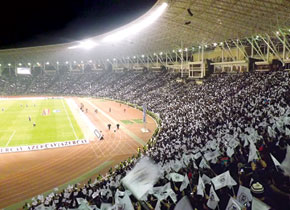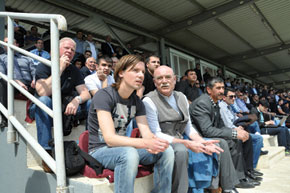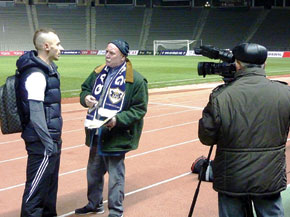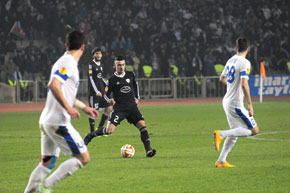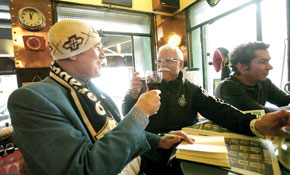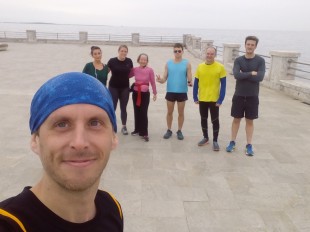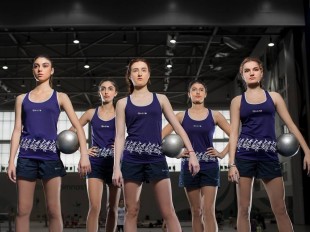(Written in memory of my adventurous father, Dr Neill Francis Goltz, 2 July 1920 – 28 September 2014. He passed as this adventure began.)
The Qarabag-Agdam ‘Refugee’ Football Club from Azerbaijan Embarks on a Historic Run in the Europa League, and Gains an American Fan
They have the unique claim in the football world of being the only team that has not played a ‘home’ game since 1993, when the city of Agdam in western Azerbaijan (and their Imaret stadium just outside the city) was occupied and then destroyed by invading Armenians, remaining a ghost-town to this day.
They are ‘The Horsemen’ of the Qarabag-Agdam Football Club* and, if still officially a ‘refugee club’ thanks to the Karabakh War, in 2014 the QA-FC team managed to rise to the dizzying heights of the group stage of the Europa League—and registered the first victory by an Azerbaijani team at this level.
And more: they were on the cusp of winning a berth in the knock-out phase of 32 European clubs when... but I am getting ahead of the story.
Arthur’s tale
I first got to know about Qarabag-Agdam almost by mistake.
About ten years or so ago, a young Dutch researcher by the name of Arthur Huizinga contacted me because he wanted to use the terrible Armenian-Azerbaijani war of 1988-94 as the theme of his university thesis. Because I had published a book on post-Soviet Azerbaijan, Arthur hoped that I could direct him to more material, and especially about the city of Agdam that had been invaded in the dark summer of 1993.
Specifically, he wanted any information I could provide about the local football club, Qarabag-Agdam, which had won the Azerbaijani Premier League that year, but had been unable to hold anything resembling a celebration; the players had rushed from their victory in Baku to the Karabakh front to assist friends and family fleeing the Armenian onslaught.
When the next season began, all ‘home’ games had to be played in stadiums usually far from their fan-base. In any case, most fans were now refugees living in tent cities or railway cars, with concerns far more immediate than rooting for their team.
While I had heard rumours about a ‘refugee’ football team wandering around the blighted Azerbaijani landscape of the post-war 1990s, I could offer Arthur little if any information on this subject. I was interested in post-Soviet political developments, and not sport. More to the point, I had never taken much interest in what we in the USA still insist on calling soccer.
Then in the spring of 2014, I received a note from Arthur that he was on his way to Baku to attend the waning days of the Azerbaijani Premier League season. For the first time in 21 years, the Horsemen had a chance of taking the title, and Arthur was determined to be with ‘his’ team if and when they did.
We met in the stand of the Tofiq Bahramov stadium, where Arthur poured out his obsessions about Qarabag-Agdam, starting with how the 1993 team played home matches under enemy fire, with unscheduled interruptions while local soldiers re-secured the perimeter, ending his rant with the hope that his Horsemen might be victorious that very day, 7 May 2014, and once again claim the Azerbaijani Premier League title. Somewhere along the verbal journey, I began to understand Arthur’s obsessions, and even start to share them.
The only problem was that while I understood a great deal about the Karabakh war with Armenia and the impact of two decades of occupation on the country and people of Azerbaijan, it was also true that I knew almost nothing about the sport called football, including the real reasons for jubilation at Qarabag-Agdam’s 4-1 victory over Inter Baku that night:
Azerbaijan’s ‘refugee’ team had just earned the right to participate in European competition.
And thus began my relationship with Qarabag-Agdam FC.
It may become one of the great, unexpected adventures of my life: me, a soon-to-be-60 Johnny-come-lately sports journalist.
Against the odds
The club’s trajectory since its uncelebrated championship victory in the bad old days of 1993 and its subsequent triumph in 2014 is in many ways identical to the trajectory of the country of Azerbaijan between those years. While many a sports team has had to go through fallow years, I would argue that there are very, very few countries on the planet that have so quickly gone from the concept of 'failed-state' to 'success-story' and had such a specific sports team at hand to mirror that process.
Qarabag (the football club) was supposed to be an oddity that had suddenly been elevated to the Big League by mere fluke, and would not only be utterly crushed by its Group F rivals, but should also be grateful to fate for having made it so far.
This was not to be the case—and while tempting to use concepts such as 'Cinderella' or 'David versus Goliath', the fact is that the Qarabag-Agdam squad in the year 2014 was just a really, really good football team, and one less blessed by luck than by solid work and training.
In the qualifying round, they faced FC Twente, a formidable team from Holland, experienced in European football.
Poor Arthur Huizinga must have had his loyalties stretched as tight as a drum!
To everyone's surprise (aside from the team itself, it seems), on 21 August the Horsemen held on for a 0-0 draw at 'home' in Baku, followed even more incredibly by a 1-1 draw away in Holland, thus winning on aggregate, because goals scored away count double.
We were all utterly pumped up and ready to achieve what many thought impossible, said Muarem Muarem, an ethnic Turk from Macedonia who is in his fourth season with Qarabag-Agdam, and who scored the club’s equalizing goal. He can also remember the long five-hour drive from the team's stadium in Quzanli, the temporary Agdam administrative town near the front line with Armenian-occupied Karabakh.
You shouldn’t expect to find anything ‘nice’ in a war zone, so maybe the fact that we were playing there, just kilometres from occupied Agdam, was like a ray of hope for the refugee community, he told me. But the relationship was interactive. If we gave the community hope, they gave us power—and we never lost a match at our ‘temporary’ home.
Holding the Dutch assault back in the ‘revenge’ match in Holland was newcomer Ibrahim Sehic, who has played for Qarabag-Agdam for the past 14 months, but never at the ‘temporary’ stadium in Quzanli. Despite this, as a Bosnian from Rogatica who lost his father during the siege of Sarajevo in 1993, he has a deep understanding of the sense of loss felt by the Qarabag-Agdam refugees and the sense of mission shared by QA-FC players.
The Qarabag club is absolutely unique, he related. I have played for bigger teams elsewhere, but there is something really special playing for displaced people. And with that aggregate win over Twente…well, it was just unbelievable! We were going to the Groups! And for them, the refugees.
Indeed, and for that stage Qarabag-Agdam were grouped with three of the Big Boys in the Euro-football world: Dnipro (Ukraine), Saint-Étienne (France) and Inter Milan (Italy), the last being a powerhouse team founded in 1908 that has won so many titles they are listed on the steps of the legendary San Siro (Giuseppe Maezza) stadium.
The line-up
The first match was played in Baku against the venerable Saint-Étienne on 18 September in a packed Tofiq Bahramov stadium, with the Horsemen having to settle for a 0-0 draw, and the heavily favoured French happy to escape with a point.
I think Saint-Étienne were lucky to pull off a draw, said a Baku-based Brit and football fanatic named Ian Peart, who, for purposes of full disclosure, is the associate editor of Visions. It was clear that through good coaching and acquisition of key players, Qarabag had become a team to reckon with on the European scene.
It was around this time that I decided to attach myself to the team, and travel with them along their epic, three-month, against-the-odds quest, getting to know them all in weirdly intimate as well as public settings.
So who were they?
Here, the players generally wear their family names on their jerseys, but are only referred to by their given names. I will give both.
The core team is Azerbaijani, many with refugee status, the most symbolic of whom is striker Vuqar Nadirov, a native of Agdam whose father ‘General’ Ershad moved the family to safety just before he was killed in action in July 1993; another is midfielder Qara Qarayev, from the occupied city of Fuzuli, who started his professional football career aged 16, being discovered as a talent while playing on a cement-rubble ‘field’ in a refugee neighbourhood in Baku; there is midfielder Namiq Yusifov, who briefly moved into his grandmother’s house in Agdam in 1993 after his father’s death in St Petersburg, only to have his mother spirit him away to Baku for safety’s sake. Team captain Rashad Sadiqov (defence) also qualifies for refugee status because his family hails from the Azerbaijani province of Kelbajar, pinched between Karabakh itself and Armenia, and under Armenian occupation since April 1993.
Other Azerbaijani players of note are midfielders Ilqar Qurbanov, Javid Taghiyev and striker Namiq Alasgarov, and of course Baku-Russian defender Maxim Medvedev. The son of a Caspian seaman who left his mother widowed when Max was 12, he was training up to become a gymnast when he had a bad fall that almost broke his neck, and gave him ‘the fear’ that he might have another one. He focused on good grades in school and had plans to become a doctor when he was somehow discovered, and started to play professional football at around age 15.
My mom wanted me to stay in school and become a doctor, he told me. But she was working—slaving—to make ends meet and suddenly that $50 a month to me looked like food on our family’s table.
No mercenary
The Azerbaijani argot for foreign player is ‘legionnaire,’ which carries something of the mercenary about it; i.e. that the foreign player is only there for the money.
But those foreign players I got to know during the Cinderella ride of late 2014 were outraged by the suggestion.
This is not about the money, said defender Ansi Agolli, who, along with defender Admir Teli, is one of the two Albanian players I got to know best over my involvement with the team. This is a team that is far more than just any team—it is a family.
Like Muarem from neighbouring Macedonia, he lived through the turbulence of the Kosovo crisis in 1999 in the former Yugoslavia (a process many compare to the dissolution of the USSR). He was also part of the Albania national squad playing in Serbia in October 2014, when the game was abandoned due to rioting.
Other ‘legionnaires’ on the squad are Dutch midfielder Leroy George, Daghestani (Russia) defender Bedavi Huseynov, as well as a quartet of Brazilians who seem to attract the most attention to the term, possibly because they seem the most exotic and have been drawn from so far away: midfielders Richard Almeida and Chumbinho and strikers Danilo Leandro Dias and Reynaldo dos Santos. Possibly due to lacking a mutually understandable language, my ‘on-the-road’ contact with the Brazilian contingent was friendly but limited; most of them did not play through the ‘Group’ matches in the European league due to injuries. The exception was Richard, who, I assume, spoke for all in utterly dismissing money as the primary motivation for playing for Qarabag-Agdam.
As a professional athlete with a limited career window, of course you have to think about such things before you sign or renew a contract, he told me. But I can assure you that I want to play for Qarabag, both the team and the support group, for as long as they will have me. He recently underlined his point by signing a new three-year contract with the club.
Out of darkness
The ethos of the Qarabag-Agdam team seems to be at least partly predicated on memories of trauma and loss—not only of the Azerbaijani province of Karabakh, but also of beloved fathers and uncles during the war and the humiliations of growing up as a stigmatized refugee on government subsistence. As the Azerbaijani core players shared experiences of sudden loss and early poverty during the course of their quest for European victory (Rashad, Vuqar, Namiq, Qara and even Maxim), the ‘legionnaires’ also revealed elements of their own traumatic childhoods, and how this has become, in an almost ineffable way a building block of team solidarity and why and how Qarabag-Agdam play as a team in a way that I have seen few teams do
We are all aware of our various histories, and sensitive to when and where we can talk about this and when and where it is best to just shut up, said Ibo, the goalie. It all makes us stronger.
Maybe I just wanted to be a star when I was a kid, said Muarem. Then my mother died of cancer when I was 12, and something fundamental changed in me. I wanted purpose, not glory. I think that attitude informs the entire team. We play for them, meaning the Agdam refugee community, and not us, meaning ourselves. Others, too, remember the period of death, destruction and national dissolution that led to the occupation of Agdam in 1993 and continues to inform the ethos of the team.
One was a young star player named Aslan Kerimov, who got his first professional job with Qarabag-Agdam in 1993 as an 18-year-old player, and retired in 2012 as captain. He can still remember his first season in the Agdam Imaret stadium.
There were a couple of matches when the Armenians started lobbing Grad missiles into the city while we were playing, he recalls. None hit the stadium, but the barrage forced the game to halt for 15 or 20 minutes until the local garrison managed to clear the perimeter, after which we began to play again.
The men who protected the Agdam stadium were a determined lot. Determined to instil a sense of normality in an increasingly chaotic situation, and determined that the Qarabag-Agdam football team play in a city under siege, thus sending a message not only to the local folks but also to the soldiers and visiting teams, who would convey it to the rest of Azerbaijan.
You might find it strange to hear that the army had time for football matches during the middle of a war, and a war that was going badly, but I have to say that as a morale-boosting strategy, it was effective, Colonel Rahim Aliyev told me during a collective interview in the Martyrs’ Avenue Cemetery in the heights above Baku, where many of his comrades lie buried. We proved that we were there to defend the local citizens and allow some element of normality back into their lives during a very critical time. If the Qarabag-Agdam team could play a match in the Imaret Stadium while the city was under enemy fire, then fewer people packed their bags and ran away.
The last competitive fixture at Imaret Stadium was an Azerbaijani Cup match played on 12 May 1993 against a team from the north-western town of Tovuz: it ended in a 1-0 semi-final victory for the hosts.
Agdam fell to Armenian forces two months later and remains an occupied, looted ruin to this day.
Rising from the ashes
‘Temporary Agdam,’ meanwhile was relocated along with the administrative apparatus of the city to a place called Quzanli, not far from the front line and in a vast ‘gulag’ of refugee settlements that started as tent cities (or box cars on railway sidings) but which have now evolved into some semblance of communities—and central to their collective identity has been the Qarabag-Agdam football team.
It was tough for the players to commute out there from Baku, but incredibly important for the refugees, said Arthur Huizinga.
But sometime around 2006, with funding from the local agricultural mega-firm Azersun Holding, Qarabag-Agdam FC began the transitional process from being ‘just’ a symbolic ‘refugee team’ to bidding to play in the Big League. This included signing foreign players and playing more in Baku stadiums and less often in the temporary home at Quzanli.
The proof seemed to be in the pudding, when the team registered a win against the Norwegian club Rosenborg in 2009, followed by its first play-off games against the Dutch FC Twente that same year.
Poor Arthur (again)!
Then, four years later, in 2014, it all suddenly looked like it was going to ‘click’.
Call it the Cinderella-syndrome, call it what you want…but for only the second time in the history of Azerbaijani football, a team was about to elevate itself into the Group phase of the Europa League, and that team was Qarabag-Agdam, the only team that had not played a home game in 21 years.
After duly delivering their Premier League trophy to ecstatic fans at the club’s official ‘home’ stadium in Quzanli, it was off to achieve the aggregate win over FC Twente in the play-offs in August, and then starting in September, the series of six matches known as the Group stage of the Europa League!
San Siro shakedown
The Horsemen had already achieved the ‘surprise’ 0-0 draw with Saint-Étienne in Baku when I joined them to joust with the legendary Inter in Milan and learned a basic rule that governs all collective sports, whether American baseball, rugby, cricket or hockey: you play with the team you’ve got on the day of the game…
There is a morning mashq, or training session, at a small stadium not far from the hotel where we are staying. I stand in the drizzle and cold with the players, my new friends, this odd American old-guy who has somehow been slipped into their midst, like a nearly 60-year-old George Plimpton, the American author who wrote Paper Lion, an insider account of the Detroit Lions football team. What, who am I to this team? But already, certain players have started to warm to my seemingly inexplicable presence and interest in Qarabag-Agdam FC.
After a quick flash-mob ‘fare-thee-well’ send-off by the Milan hotel staff, we are wheels up on the highway leading to the fabled 80,000-seat San Siro stadium. It is, one might say, just a little intimidating.
While the Horsemen start well, they are playing without not only their star Brazilian striker Reynaldo, but also the QA-FC captain, Rashad, who has been slowed by a pulled hamstring. Namiq Yusifov is tasked with leading the team on the field until the last 15 minutes of the match. Maxim Medvedev sits out the entire event in the stands, nursing a sour stomach.
Inter Milan score early on and the Azerbaijanis are shaken and re-group as a completely defensive team.
But even this does not help: they concede a second goal six minutes from the end and it is all over, aside from kind words uttered by the Italian coach at the post-mortem conference: Qarabag were tougher than we expected, he says. I would not be surprised if they took second place in Group F and went through to the Knock-Out phase…
Sweet and simple words from the winners, who had almost certainly assured their passage to the next level and could afford to be magnanimous in victory.
The analysis delivered by QA-FC coach Qurban Qurbanov was much more direct.
There are games that you win while playing badly, and games that you lose when you play well, growled the taciturn, steel-eyed coach and former star striker. But we did not come here to lose and feel good about it because we were playing Inter-Milan. We came here to win. Sadly, we did not—and will study the reasons for our defeat, and endeavour to correct our shortcomings. We look forward to seeing Inter Milan in Baku, where we hope to anticipate a different result.
Classic coach Qurban Qurbanov: terse, precise. Not an extra word uttered.
Back to the day job
My fly-on-the-wall status by now well established, I continued to travel with the club through its ups and downs, not only abroad for the big UEFA Group matches, but also when playing regular Azerbaijani Premier League in between, travelling by midnight bus and sleeping two-to-a-room and eating junk food in places such as Zaqatala and Qabala and Lenkeran as well as multiple matches in and around Baku.
At one point I noted that the QA-FC team had played three matches inside a week, and that that ‘week’ was actually only six days, and that during those six days the QA-team had flown to France, returned to a regional airport in central Azerbaijan, bussed four hours to a place on the Russian/Georgian frontier, played (and won) and then got on another bus to return some eight hours later to Baku, only to play another Azerbaijani Premier League match two days later at some utterly forlorn stadium on the shores of the Caspian Sea, with sleet and snow flailing at horizontal levels, negative humidity burning cold into our bones and the wind lifting balls kicked to safety only for them to fly back as re-appearing nightmares, falling beyond launch point.
And more.
Aside from the handful—a dozen? two dozen?—of Imaret Tayfa fans in the massive MOIK stadium, there was no one else there.
No one.
It must have felt very odd going from a match before 20,000 howling spectators in France to (in effect) play only for oneself, but such is the nature of the game…
Muarem downs Dnipro…
Family circumstances back in the USA dictated that I miss both away and ‘home’ matches against the post-Soviet Ukrainian powerhouse Dnipro, but I believe I have a pretty good take on both from the players’ perspective.
The away game was held in Kiev on 23 October.
What made this unique was that Dnipro were playing a ‘home’ game at an ‘away’ stadium—Kiev. Its home turf in the eastern Ukrainian city of Dnipropetrovsk was too dangerous to play in, thanks to the Russian-inspired separatist unrest there. Thus, Dnipro, too, had become some sort of ‘refugee’ team.
The huge Ukrainian national stadium was half empty.
But there, in the 21st minute, Bosnian goalie Ibo plucked down a cross, threw the ball to Macedonian Muarem who passed it infield to Brazilian Richard, who in turn passed it back left to Muarem, a feint left, shimmy right – One Two Three GOAL!!!
If anything is lacking in the general analysis of this historic shot, it is this: Muarem bends the ball into the net, and then raises a hand telling his teammates not to mob him just yet. He then seeks and finds a direction he knows, bends to his knees and puts his forehead on the ground, towards Mecca.
In subsequent discussions with Muarem, I have discovered an inquisitive Muslim mind, and one asking questions about religion. While I never asked him directly about that or other goals he scored, I am absolutely certain that he has attributed all to God.
The same is true about other major players on the QA-FC squad (aside from the Brazilians, Albanians and LeRoy George from Holland): they are practising Muslims, and thus footballers who attribute their success (or failure) not to any fan-club base or ego-event, but to the desires and decisions of Allah.
Curious.
But back to the match.
With 69 minutes left for Dnipro to level the score, the yeoman’s work was left to Qarabag goalkeeper Ibo Sehic, to deflect away increasingly desperate Dnipro attacks. The assaults were all in vain as the Bosnian dived and leapt like a mad rabbit, fending off all shots—and at the 90th minute whistle, Qarabag had its prize:
A 1-0 upset!
Not only had Qarabag-Agdam become the first Azerbaijani team to win a game at the Group stage, it was suddenly now in the running for the Europa League Knock-Out stage—a level that no Azerbaijani team had ever achieved.
(An odd, post-match anecdote: when a Ukrainian/Dnipro player was quoted as complaining about playing in Kiev as opposed to Dnipropetrovsk, Had we played at home, we would have won! my new pal Ansi Agolli came up with the following rebuttal: Were we able to play in our home stadium of Imaret in Agdam, we would beat Barcelona.)
But pride cometh before a fall, and the come-uppance came in the form of a ‘revenge’ match two weeks later, and a 6 November, 1-2 ‘home’ loss to the Ukrainians. At a packed Tofiq Bahramov stadium in Baku, Dnipro scored first; then, after a beautiful equalising free kick by Leroy George, the relentless Nikola Kalinic came back with his second.
I would trade that goal of mine for three others by any other players, anytime, ‘Little George’ told me.
In real terms, this meant that Cinderella was back in the cellar, with two tough matches left to try and claim second place in Group F and at very long odds: a return joust against Saint-Étienne in France, and then the final, revenge match against Inter Milan in Baku.
Let the best team draw
Saint-Étienne was (and is) a swell and very friendly little French town on the Rhone River, somewhere on the way to Switzerland and northern Italy. I had never heard of it before in any context, but was soon told by an informed source that Saint E (as I began to call it) was an ancient, historical city where the bicycle was born, and had also been the armoury for France for centuries, but particularly the 1800s, meaning the Napoleonic wars, as well as the conflicts that led up to WWI.
You must see the Industrial Museum! admonished my coincidental host, Georges Perez, who I met in the downtown vegetable and fish market the day before QA-FC met ASSE (as the St.-É team is known). Then you will understand the nature of our plebeian team!
Unknown to me upon meeting Georges in the city market and accepting his invitation for a quick drink in his favourite bar, he was a vice-president of the youth section of the French club, and would be on the field with his kids to lift the UEFA emblem prior to the match.
Let the best team win! cried Georges, lifting a glass of Rhone River wine. Sport is not about winning; it is about sport!
The road to the Geoffroy-Guichard stadium (capacity 40,000) was packed with devoted fans of ‘Les Verts’ (‘The Greens’), rightly proud of the dynastic team that has won ten league titles since its founding in 1919, and is regarded as one of the most successful French teams in history, and apparently proud of their reputation for rowdy behaviour. Certainly, there were catcalls against Qarabag as we entered the stadium via a secure, police-controlled corridor.
I managed to cadge a pass to the VIP section to sip champagne with the president of the regional football association and exchange my Qarabag-Agdam scarf for his ASSE one, at which point some other eminent Saint-Étienne fan hissed They are criminals! A local Armenian? I wondered.
Shuffled out to prime seating and huddling against the night’s cold with special guest Aslan Kerimov, I noticed my new friend M. Perez down on the field as his Youth League kids carried the UEFA emblem off the pitch, announcing the start of the match.
The Qarabag lads play well, testing the French defence, probing here, probing there and then, in the 15th minute, striker Vuqar Nadirov races between two defenders to chest down a long pass, and then perfectly lobs the ball over the head of the Saint-Étienne goalie in an arc against which there is no defence.
Goal!
In the stands, the Azerbaijani Amigos go completely crazy—me too.
Then, like Muarem in Kiev, Vuqar shuns the usual celebratory embraces and methodically gets on his knees and bows his head to the ground, apparently performing a Muslim namaz, or prayer. I later asked Vuqar whether he was thinking of his martyred father Ershad right then.
Of course, was his simple response.
But the astonishing goal only serves to re-motivate Les Verts who return the favour by scoring six minutes later with a stinging slash by Ricky van Wolfswinkel past Sehic. Once again, for the rest of the game, Qarabag goalie Ibo is flinging himself to the right and left and leaping at impossible angles to fend off the relentless Saint-Étienne attack.
Then, with the final whistle announcing a 1-1 draw, the Horsemen’s trial-by-fire is over, and with the draw feeling like a long-awaited victory!
With that ‘away’ goal, Qarabag-Agdam are once again back in the running to take second place in Group F, and progress to the Knock-Out stage of 32 teams…
Down to the wire
Back in Azerbaijan, we are also back on the road, acting like just any other Premier League team—playing here, playing there. It is the team’s duty to win, and it remains on top of the Premier League, acting for all the world as though there is no big game coming. But I and everyone else in Azerbaijan certainly know there is.
The Inter-Milan ‘revenge’ match, to be played on the Tofiq Bahramov pitch in Baku, on 11 December 2014.
Finally, the big day, and the 35,000-seat Bahramov stadium in Baku is packed to overflowing, with thousands of ardent fans fighting over touts’ tickets outside the gates.
No, this would not be just any game. This would be, could be, history.
But history is made up of details, and here are a few.
With five games played, Inter Milan have already secured passage to the next stage, and while clearly determined to win against Qarabag-Agdam in this final Group match, the Italians have fielded a number of younger players to gain experience, guarding its veterans against potential injury.
Fair enough.
But this is not necessarily to the advantage of Qarabag, as all pre-game study of the opponents has been of the original line-up, and the new players clearly aim to prove themselves.
Also, the Qarabag side is still lacking key players like Reynaldo (and will lose his fellow striker Vuqar to an injury early in the match).
With the exception of the Italian ambassador and a few other foreign visitors (myself included), the entire, throbbing mass of humanity in and around Tofiq Bahramov is solidly Azerbaijani, and from all walks of life—rich, poor, urban, rural—and with each seat in the stadium graced by a Qarabag-Agdam flag to wave, creating a literal sea of blue and white. Meanwhile, ‘flash-mob’ master Shaqir Eminbeyli (with a little help from lil’ ol’ me) has arranged for a 15 motor-cycle ‘surprise’ police escort to intercept the team bus on the airport highway while on its way from the club’s HQ to the stadium, with each bike dangerously festooned with huge club banners and Azerbaijani flags.
It is mad outside the stadium, and mad inside. And once on the pitch, the Qarabag boys play like men possessed, needing a victory to secure the coveted second spot in Group F and progress to the Knock-Out round of 32 teams.
Perhaps unknown to the players, the need for victory becomes even more acute when up in Kiev, Dnipro defender Artem Fedetsky scores against Saint- Étienne, effectively moving his team from the bottom of Group F to second if they can hang on.
Meanwhile, in Baku, the match has run through regulation time and is in the fourth of five minutes’ extra time when there is a sudden flurry around the visitors’ goal, a blocked shot, a rebound and suddenly the ball is loose in front of goal, just waiting for Richard to wind up his left foot and rocket the ball, which cannons off a defender’s leg and bounces into the far right corner of the net, with the goalkeeper wrong-footed. Anguish is written all over the face of the Inter defenders, and every last person in the Tofiq Bahramov stadium rises, delirious with joy, including a certain now 60-year-old recent acolyte to the Beautiful Game.
And then, in a weird, warped echo of the so-called ‘Wembley Goal’ awarded by Azerbaijani linesman Tofiq Bahramov in 1966, and some long seconds after the fact, the Czech linesman raises his flag to call Leroy George mysteriously offside, and rule out Richard’s perfect goal.
Thirty seconds later, the referee blows the whistle on a match written in Hollywood (or maybe heaven or maybe hell) as a 0-0 draw, while up in Kiev, Dnipro have held on for a 1-0 victory over Les Verts, to take the number 2 spot in Group F on aggregate points, and the Cinderella story of Qarabag-Agdam’s chances in the Europa League 2014-15 is at a sudden and bitter end.
A glorious, unacknowledged aftermath
The stunned, angry and heart-broken fans stumble home, perhaps not even noticing that the Qarabag-Agdam players have walked off with heads held high, secure in the knowledge that they had achieved a 1-0 victory over Inter, even if it would be a statistic never to enter the records, but remain written on their hearts forever.
And world soccer had earned a new diehard fan—me.
I am already looking forward to Europa League 2015-16…
*The team takes its name from the two beautiful Karabakh horses on their club badge while ‘Qarabag’ is the original Azerbaijani spelling of the mountainous region of western Azerbaijan usually rendered as ‘Karabakh’ in English.
